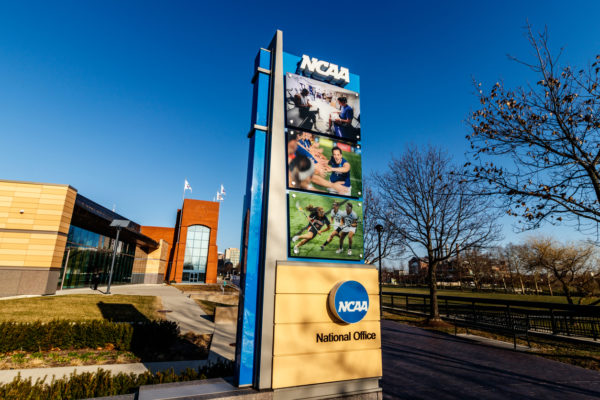In the 150th anniversary year of college football, the state of California handed the NCAA an unwanted gift: Senate Bill 206. The Fair Pay to Play Act, signed by Gov. Gavin Newsom on the set of LeBron James’ “The Shop,” represents a seismic shift in the landscape of college athletics.
And the group who has the most to gain from its passage? Female athletes.
In short, the law frees college athletes to get compensated for the use of their name, image and likeness. And to counter the paternalistic argument that naïve college students will get taken advantage of (isn’t that what the NCAA is already doing to them?), the law enables athletes to retain legal counsel or agents to advise on such matters without losing their eligibility.
The issue of allowing players to monetize their name, image and likeness summons the usual refrains from supporters and detractors. Detractors will exclaim that paying players turns “amateurism” into professional sports and taints the purity of the game.
Moreover, it is highly likely that the NCAA will not only mount legal challenges to the law, but may also bar California colleges and universities from participating in NCAA competitions.
What seems to be the central issue is a blurry distinction between what constitutes “amateur” and “professional” sports. When one looks at the balance sheets of plush athletics departments and salary totals for elite coaches, college athletics appears to be the fraternal twin of pro sports with one distinguishing feature: a cheap labor force.
Aside from the multimillion-dollar contracts of head football and men’s basketball coaches, one stat should raise the eyebrows of anyone’s conscience. The NCAA, a nonprofit, will receive an average of $1 billion per year for the TV rights to broadcast March Madness. Currently, that deal runs through 2032.
The Fair Pay to Play Act does not mandate that players be paid. It merely allows them the option to get compensated. Female athletes, who lack viable professional playing options, stand to benefit the most.
According to the NCAA, of the 3,692 draft eligible female players, 32 were drafted in 2018. That’s about 1 percent. And as advocates such as Megan Rapinoe have highlighted, the pay disparity between professional male and female athletes is wide and deep. The maximum salary for a WNBA player is $113,500, whereas the minimum salary of an NBA player is $838,464.
Consider one example: Katelyn Ohashi. Ohashi, a former UCLA gymnast, performed a gravity-defying routine in January that not only garnered a perfect 10, but also catapulted her through the social media stratosphere. The number of views for her routine, a video hosted on the UCLA Athletics YouTube page, had attracted more than 64 million views.
For Ohashi, this moment could be the zenith of her athletic career. What if she wanted to return to her hometown of Seattle and host the Ohashi Gymnastics Camp or sign a sponsorship deal with a local car dealership?
Under the old system, she would immediately lose her scholarship. Under the Fair Pay to Play Act, Ohashi could capitalize on that narrow window of opportunity to secure private sector compensation. The money generated from the Nick Saban Football Camp may represent a blip on the balance sheet of the Alabama head football coach, but for a collegiate athlete, the extra funds could be a game changer.
Will female athletes secure the same profits that head coaches or even male athletes command? Absolutely not. But California’s bold move at least gives them access to some of the capital previously reserved for their male counterparts.
The bill’s co-sponsor, state Sen. Nancy Skinner, put it best: “College is the primary time when the spotlight is on. For women, this might be the only time they could make any money.”
Daron Roberts is the founding director of the Center for Sports Leadership and Innovation at The University of Texas at Austin.
A version of this op-ed appeared in CNN Business.




